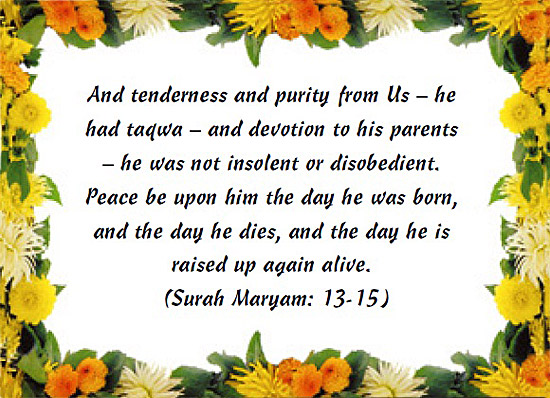Adherence to the Values of Religion Solves all Social Problems
In earlier sections we discussed in detail the state of mind and attributes of those who are bereft of religious values, and the typical human characters these attributes produce. In this section, we will see how age-old social problems can be solved in a society where religious principles are adhered to.
Every Sort of Degeneration Ends
The most distinctive characteristic of societies not bound by the principles of religion is the prevalence of degeneration and its deep penetration into all levels of society, which becomes more chronic with each passing day. Since people do not follow Qur'anic precepts and are bereft of values like the fear of Allah or the necessity of earning Allah's approval, there is nothing to hinder this degeneration. There are, of course, some traditions, customs and social laws developed by individuals or leaders, which shape the general conduct of society. But, because these have been developed by man and the majority lack fundamental fear of Allah, their impact on society is feeble. Ultimately, they fail to restrain behavior which is cruel, unconscientious and inhuman.
To give an example, there is no reason why one who conducts himself immorally should not indulge in ever more immorality. Think of an employer; if he does not have faith in Allah and feels no fear of Him, he has already decided to act unconscionably, and hence becomes a person ready to take any opportunity to put this decision into action. The reason for this is that, not obeying the commandments of the Creator or appreciating the favors granted by Him are already the most serious examples of unconscientious behavior. Therefore, from his own personal standpoint, there is no reason why this employer should not mistreat his employees at the workplace, offend them or try to make them work the maximum time for the minimum wage. Within his own twisted logic, these are reasonable attitudes for him to take. Towards his business partners, he takes the same improper attitude; he cheats them or resorts to illegal ways to quickly amass a fortune, and there is nothing to restrain him from doing so.
As stated earlier, when Divine rules are not the source of social criteria, moral understanding will differ greatly from one person to another. An immoral attitude rejected by one, may well be perfectly normal for someone else. Hence, wherever religious values have no influence, people, societies, ages, regions, cities, and countries set their own moral values, which are different from one another. In the absence of a unified perspective regarding moral values, society becomes the setting for numerous disputes and conflicts over what is right and what is not right. Every new generation becomes more degenerate than the previous one.

Homosexuals, known for their disposition to depravity, are one of the consequences of societies which lose their belief. The Qur'an has this to say on the subject:
"You come with lust to men instead of women. You are indeed a depraved people."
(Surat al-Araf: 81)
Moral degeneration corrupts societies at an ever increasing rate every year. Societies rapidly become corrupt when there is incomplete faith in Allah. In this way, a form of conduct that is regarded as extreme one year is embraced by the same members of society the following year. This progressive decline surely brings ruin to society, and immorality, a consequence of disbelief, spreads with each passing day. What is interesting is that immorality is literally portrayed as "modernity" and becomes the greatest topic of misleading indoctrination in societies. A way of thinking which is summed up in the motto "The man of the 21st Century should be free and unrestrained" is instilled into unsuspecting minds by disbelieving ideologists.
Whole generations are introduced to immorality at very early ages. Indeed, there is a considerable increase in the number of children who commit murder in America and Europe. From the Far East comes the grievous news of children being exposed to every sort of sexual abuse for commercial purposes. During the 1980s, sexual perversion was a subject people were too embarrassed even to talk about. Today, however, people are apt to perceive such relations as a part of the “modern way of living” and even feel sympathy for those having perverted relations. Those opposing them, on the other hand, according to these people’s twisted logic, are accused of not being modern. This critical attitude of people living in disbelieving societies is deplored in the Qur'an:
Those who love to see immorality being spread (or publicized) among those who believe will have a painful punishment both in this world and the hereafter. Allah knows and you do not know. (Surat an-Nur: 19)
On the contrary, it is unlikely that moral degeneration should exist in a society where the morality of religion prevails. After all, with their deep fear of Allah, individuals avoid immorality. To this end, it suffices to comply with the commandments of the Qur'an. For instance, in the following verse, the moral criterion set by Allah is clear:
Allah commands justice and doing good and giving to relatives. And He forbids indecency and doing wrong and tyranny. He warns you so that hopefully you will pay heed. (Surat an-Nahl: 90)
Believers who acknowledge these commandments of the Qur'an pay meticulous attention to observing the limits set by Allah. Thus in a community of true believers, there is very little immoral behavior.
If exceptional cases arise and some individuals do wrong, this will again not become a problem in society since true believers will not allow this immorality. Furthermore, contrary to the state of affairs in ignorant societies, it is unlikely that this immorality would be encouraged or become widespread in society as a whole. That is because one of the main duties of believers is to "command what is right and forbid what is wrong," as is stated in the following verse:
True believers, both men and women, are friends to one another. They command what is right and forbid what is wrong, and attend to their prayers and pay alms, and obey Allah and His Messenger. They are the people on whom Allah will have mercy. Allah is Almighty, All-Wise. (Surat at-Tawba: 71)
Hence, a society where Qur'anic values are observed is also a morally elite community, because, there, "… believers compete in doing the good." (Surah Al 'Imran: 114) Another virtue of believers is alluded to in the following verses:
Who could say anything better than one who summons men to the service of Allah and acts rightly and says, "I am one of the Muslims"? (Surah Fussilat: 33)
Those who listen well to My precepts and follow what is best in them, are the ones whom Allah has guided. They are people endowed with intelligence. (Surat az-Zumar: 18)
Allah spells out the attributes of a community whose members live by the principles of religion:
You are the best nation ever to be produced before mankind. You enjoin the right, forbid the wrong and believe in Allah… (Surah Al 'Imran: 110)
In one of his sayings, our Prophet (saas) also stated that "a believer is a mirror to another believer," (Abu Dawud) and invited believers to set an example to each other by evincing good character, saying, "The believers whose faith is most perfect are those who have the best character." (Abu Dawud)
It is obvious that such a society is morally superior to a disbelieving society.
Adherence to the Values of Religion Strengthens Family Ties
A strong and successful social structure is based on families with strong ties. The degeneration of society becomes inevitable once family ties disintegrate. Ideologies like communism, fascism or socialism, which rest on anti-religious grounds, primarily target the family. There, the intention is to eradicate institutions like marriage; and to erode such values as the precious nature of motherhood, marital fidelity, privacy and honor. Thus, philosophers and advocates of such ideologies present these values as worthless and empty. For instance, living together without marriage was formerly totally rejected by society while, today, it is regarded as commonplace. Furthermore, the average age of people living together without the bond of marriage is steadily decreasing.
Society's outlook upon marriage is generally flawed. Girls often see marriage as a sort of life insurance. With this in mind, their basic criterion is material wealth. At times, status, good looks and environment also become important factors in the decision to marry a man. Quite frequently, the most important criterion is money and possessions. Not surprisingly, the soaring divorce rates reveal the hollowness of marriages resting on transient factors such as money, status or good-looks.

Another common threat to marriage is the expectations men have of their spouses. Generally, an attractive wife is what a man considers as a must for his marriage. A high level of education and the mastery of various skills also contribute to a man's decision. Doubtless, there is nothing wrong in possessing these "assets" which couples seek in one another. However, if marriage, which should be based on concrete grounds, is solely founded on these factors, the collapse of the family becomes inevitable whenever one of these factors is missing.
Marriage demands fidelity, love and respect, the type of concepts that become binding and solid values purely through religion. Consequently, it is only religion that ensures that a marriage will last.
Built upon such irrational understanding, marriages generally lack a sound premise. In consequence, couples soon lose the love and respect, as well as the intimacy, they feel for each other. No sooner do they start living together than they start to see the negative sides of one another. This leads to arguments, fights and severe accusations. Some time later, they accept things as they are and start experiencing the same classic vicious circle as other people. Born into such families, new generations also become psychologically unstable. In compliance with their parents' teachings, they grow into adults who are bereft of love and respect.
In societies where religious values are not adhered to as a guide, family ties often break down. Money, in particular, plays a considerable part in the relations between immediate family members. A generous husband is always loved by his wife and paid due respect by his children, because of his money. But it is easy to understand the true nature and the sincerity of this love, however; if, one day the father ceases to support the family properly due to his failing business, this love and respect is suddenly replaced by anger. Money becomes a constant reason for tension and conflicts in the family. There is no guarantee that one day his wife will not leave him when her husband faces bankruptcy or when he cannot make as much money as he used to. Usually, in such cases, the marriage comes to an end. This is surely one of the consequences of not living by the principles of the Qur'an.
How a believer sees marriage is totally different to how an unbeliever sees it. Being aware that an eternal life awaits man after death, a believer intends to remain married for all eternity. What such a person seeks in his or her prospective spouse is merely closeness to Allah. In other words, the person with whom he will live for all eternity has to live by the Qur'an. This is because it is known that all the traits man possesses in this world are temporary. Where both spouses turn to the Qur'an as a unique guide, love and respect predominate throughout their married life and the couple live in perfect harmony. In the event that one of them makes a mistake, the other reminds him or her of the values of the Qur'an, and thus the problem is solved, since it is unlikely that a believer would not respond to this call. For all these reasons cited above, people having faith in and fear of Allah build their marriages on solid ground.
But it is not correct to limit the concept of the family only to relations between husband and wife. The attitude children have towards their parents and older members of the family is also important, and in an environment where religious principles prevail, love and respect govern these relationships. Disrespectful and rude manners of speaking, shouting and arguments, which are all very common in almost every home today, are entirely absent. Instead, peace and joy prevails. No more family disasters happen. Everyone cherishes his family, which constitutes an incomparable model of family living. Children see their parents as a blessing and feel great attachment to them. Likewise, parents feel that their children are given into their protection by Allah. "Family" means warmth, love, trust and solidarity. Yet, it should once more be emphasized that such a healthy family environment demands a complete and sincere devotion to religious values as well as a profound fear of and love for Allah.
A Bond of Love and Respect is Established among the Members of Society
In discussing the non-material effects of disbelief on man, we mentioned that unbelievers cannot recognize true love and respect. A society consisting of such people is surely one in which its members, be they young or old, country or city-dwellers, cannot embrace one another warmly. Under these circumstances, the individual often feels himself lonely and fears that he is not loved by anyone. Everyone thinks only about himself. The love and respect they think they have for one another is actually not the one meant by the Qur'an. The main reason for this is that they base all their values on interest-ridden concerns.
Nobody respects another because he simply feels so. An employee knows he has to show respect to his boss because he will otherwise be dismissed. A student has to respect his teacher at school, otherwise he might fail his class. Similarly, a woman feels the urge to treat her husband well, fearing that he may stop providing for her. Yet it is quite evident that the respect shown in all these examples is interest-oriented.
In a life-style dominated by Qur'anic morality, however, you never witness such situations. Naturally, everyone respects a believer who strives to earn Allah's approval and who goes in fear of Him. To be held in high esteem, he does not need to be a celebrity or well-to-do. Just having faith, fearing Allah and seeking His approval are enough for people to have respect and love for him.
We mentioned in previous chapters the type of morality and spirit people possess in disbelieving societies. Now think about a society consisting of such people. Can this be the type of society where love and respect prevail? Of course not. A person having no love for Allah, the One Who creates him and grants him every favor, naturally can never love His servants either. The sole solution to this is surely a society where people live by the principles of religion.
The Horror of Drinking and Gambling Ends
One of the things which strikes one most in this gloomy picture of a society where religious values are not observed is the fact that drinking and gambling have become a way of life for the majority. Not living by the principles of Islam, its members do not know what is meant by patience, or hope, or putting trust in Allah. That is why they primarily seek relief in gambling or drinking whenever they face an ordeal.
When things do not go their way, when they become angry, feel bored or sorry for themselves, and even when they rejoice, they immediately resort to alcohol and, in their own way, "find relief." However, in this they do nothing but harm themselves as well as others. As they drink more, they lose their consciousness, a pretext which supposedly exonerates them from all blame. They offend people and act improperly in society without any embarrassment. People do not feel astonished when they see someone who conducts his business seriously in daily life crying himself to sleep when drunk at other times.
Losing consciousness because of drink, with all the ill effects that follow from it, is clear evidence of the unrest it brings to society. It is not uncommon, for instance, for a man to lose everything he possesses in just one night of gambling, or after drinking, to commit murder, violence, suicide, etc. These evils are referred to in the following verse:
You who believe! Wine and gambling, stone altars and divining arrows are abominations devised by satan. Avoid them completely so that hopefully you will be successful. Satan wants to stir up enmity and hatred between you by means of wine and gambling, and to debar you from remembrance of Allah and from prayer. Will you not then give them up? (Surat al-Ma'ida: 90-91)
Because the religion of truth prohibits gambling, believers stay well away from it. The fear of Allah in their hearts guarantees this avoidance. Whatever the circumstances are, however compelling or alluring they might seem, they never give in. From the standpoint of religion, there are no pretexts or legitimate excuses which may be put forth. Nobody commits the immorality of finding pretexts, since an unlawful act in religion prohibits any concessions or leniency.

Social diseases such as drugs, alcohol, gambling and violence are the inevitable consequences of failing to keep oneself occupied with the remembrance of Allah. Nobody who is aware of the favors granted by Allah, and thus his responsibilities towards Him, is affected by these diseases.
Where people do not adhere to the principles of religion, their values and judgments become unreliable in nature, since they change according to time, circumstances and associates. Different interpretations arise based on these factors. Gambling and similar misdeeds may be unacceptable in some places, while it becomes quite unexceptional even for those who see it as an evil, provided that it is engaged in in particular places like hotels. Even one who, as a principle, does not gamble, feels free to indulge in gambling when he finds a "proper" place.
If anything is accepted to be evil or immoral, it should be strictly avoided under all circumstances. Acting differently according to the company or conditions one finds oneself in is an evident indication of a feeble character. It is unlikely that one who is unaware of religious morality could ever display a strong personality or will.
The Problem of Drugs Disappears
A report prepared by the United Nations in 1997 shows that 200 million people all over the world use drugs. Every day, newspapers and television supply in-depth coverage of news about drug abuse and addiction, which, in a way, numbs our minds, causing us to see this subject as nothing out of the ordinary. But reflecting upon these evils provides us with a better understanding of the weakness of this acceptance: is it acceptable that man, being the most conscious of all living beings on earth, should depend on an irreversible addiction to a few milligrams of some substance or material and, when deprived of it, lose consciousness and even suffer a complete breakdown?
Those who are addicted to drugs often start by saying, "Nothing will happen if I only try it once." Consciously or unconsciously, these people often develop a rebellious nature. They generally develop "rational" excuses for their addiction, which are nevertheless inherently feeble. Ignoring their personal weak-will or weaknesses, they put all the blame on the people surrounding them. Family problems, failures at school or in business life, disputes in social life, financial problems, things not going their way or being depressed for one reason or another are often seen as adequate reasons to make them fall by the wayside. Once they are invaded by this spirit, they develop a negative outlook and drift into even greater gloom and negativity.


When the morality of Islam prevails, such images will disappear from the world for good. Rather than in drugs, people will seek happiness in earning the good pleasure of Allah and in displaying moral perfection.
Faced with life's difficulties, they feel weak. Indeed, since they do not see our Creator as their friend, they have no one to trust. They seek the solution in forgetting everything and losing true consciousness. With this in mind, each day they increase the amount of drugs they take and prepare their destruction with their own hands. Besides, having no faith in an eternal life after death and assuming that death will put an end to their very existence, they aim to make the most of life, but they feel terrified because life, which they want to make the most of, turns into a nightmare for them. They ultimately face a deadlock, as the problems weighing heavily in their daily life bring them to physical and mental ruin.
Judicial measures alone have proved insufficient to solve the problems related to drug addiction. The solution is fearing Allah and avoiding what is unlawful.
This horrible mood of exasperation and rage which they experience is, in reality, their recompense in this world for pursuing their own wishes and desires-i.e., not conducting themselves conscientiously-instead of seeking Allah's pleasure.
Allah granted man wisdom, will and conscience and promised him a blissful life both in this world and the next, provided that he aim to please Him. Otherwise, a torment would await him both in this world and the hereafter. The truth is, only those seeking ways to come close to Allah may feel secure in the hope of attaining the eternal life of Paradise and of leading a peaceful and comfortable life in this world.
Closeness to Allah, the eternal Owner of the heavens, the earth and everything in between, is surely the greatest support one can ever receive. That is why believers are the strongest and most resistant people in the world. They have strength of will and keen awareness. As well as not showing weakness, they do not consider it proper to harbor any weakness in their souls. What makes them so strong and resolute is their profound faith in Allah and their sincere devotion to the religion sent by Him.
There Is No Prostitution
Do not commit fornication. It is an indecent act, an evil way. (Surat al-Isra': 32)
Fornication, one of the acts prohibited in the Qur'an, is a great crime which will degrade man both in this world and the hereafter, unless one repents of it.
Fornication, or prostitution, brings numerous ills to society as well as to the individuals committing it. For believers, that it is prohibited by Allah is sufficient reason to avoid and hate it. One has to keep in mind that Allah encourages marriage, which is legitimate in terms of religion.
Furthermore, witnessing the distinct harm prostitution does to society is another factor fortifying the faith of believers. Believers take heed of what befalls those who, without observing any limits, commit prostitution, which is strictly disallowed and condemned by Allah in the Qur'an.

Due to prostitution, many people have lost their honor, self-confidence, respect and have regressed to a humiliating life-style. Prostitution has ruined many families and brought unhappiness and unease into their lives. It has also added to their psychological troubles. However, complying with the commandments of Allah, if they favored whatever is lawful, they would attain a peaceful psychological state, regain self-confidence and preserve mutual love and respect. This would also ensure the establishment of healthy families and, accordingly, healthy societies.
In the degeneration process of societies, prostitution plays an indisputable role, since it targets the core of society, the family. Members of a society wrecked by prostitution lose both their self-respect and the respect of the people surrounding them. It would be erroneous to think that people become involved in prostitution merely for money. Often some kind of personal interest is involved, but be it long or short term, it is still prostitution. In such cases, people generally seek mental relief in the assertion that "they do not expect any material gain" in their relations. Yet, this is indeed a great deception, since once one fails to observe Allah's limits, it is no longer realistic to talk about a lawful act. In the Qur'an, Allah informs us that every sort of extra-marital sexual relation is unlawful. That is why, we cannot confine prostitution to one particular mold.
Leaving this aside, being aware that prostitution is unlawful, the majority of those who commit this sin suffer, deep in their hearts, severe pangs of conscience and great unease. Even if they deny it, the fact that they lose their self-confidence is a clear indication of this.
Another harm prostitution inflicts on society is the setting up of places meant just for this purpose. As prostitution spreads, the number of these places also increases, rapidly leading society to ruin. Young people are attracted to these places, family ties loosen and unfaithfulness becomes common. However, Allah calls man to the sort of environment where security, faithfulness and trust dominate and mentions this as a blessing.
Throughout world history, many people have chosen to make their living from prostitution and hence have elected to degrade themselves. Today, prostitution is portrayed as an easy way of making money. Yearning for a luxurious way of living and making more money, many people are disposed to lead a shameful life. In the Qur'an, Allah warns people against this danger:
Satan threatens you with poverty and commands you to do what is indecent. But Allah promises you forgiveness and His bounty. Allah is All-Encompassing, All-Knowing. (Surat al-Baqara: 268)
However, if one wishes to take Allah as his protector and intends to have the honor of being a believer, then Allah will provide him with sustenance of the best, offer him many opportunities and thus make him rich out of His Mercy. Indeed, by the Will of Allah, an honorable and sincere believer will be blessed with many favors both in this world and the next. As a test, however, Allah may give limited resources to a man. In such a case, he is rewarded with many favors in the Sight of Allah, if he ponders over the temporary nature of this world.

Prostitution, an established system which humiliates millions of women all over the world, can be eradicated only by living by the values of religion.
However, it will be useful to recall that a person may make any sort of mistake in this world. It is quite possible that one may have committed sins considered unlawful in the Qur'an, or spent most of one's life in prostitution or any other kind of unlawful sexual intercourse. However, when one is summoned to the true path, if one turns to Allah in sincere repentance, one will, by the Will of Allah, find Him the Acceptor of repentance. However, one should also consider the fact that the sort of repentance one hopes Allah will accept is not of the insincere kind made at the approach of death. Allah made this manifest in the Qur'an:
Allah accepts the repentance only of those who do evil in ignorance and then repent quickly after doing it. Allah turns towards such people. Allah is all-Knowing, all-Wise. There is no repentance for people who persist in doing evil until death comes to them and who then say, "Now I repent," nor for people who die rejecting faith. We have prepared for them a painful punishment. (Surat an-Nisa': 17-18)
Nobody Makes a Living outside the Law
In the previous sections, we discussed at length how people far removed from the values of religion do not have a real sense of faith in the hereafter, and thus they attach too much importance to this world and observe no limits in following their desires. These people may do anything to pursue their whims, including losing their honor. According to their distorted rationale, they will ultimately die and be reduced to dust, therefore, they have to make the most of this life, which is rather short. They make money their ultimate goal, since they consider it the key to any sort of success in this world. In their own misguided thinking, if they have money, they can attain anything they wish. This is actually the point at which they display their moral weaknesses. They will become embroiled in anything to make money, so long as they are not obliged to work hard.
Such people are prone to every imaginable evil such as fraud, treachery, swindling, theft, embezzlement and bearing false witness. The plethora of such news in the daily press suffices to remind us of this fact. We are all familiar with stories of murders committed to inherit a fortune, or people encouraging their wives, daughters or neighbors to engage in prostitution for money or in other kinds of fraud.

Stealing, a prevalent way of making money in disbelieving societies, is a form of immorality that Allah forbids in the Qur'an. Allah commands:
"Do not devour one another's property by false means nor offer it to the judges as a bribe, trying through crime to knowingly usurp a portion of other people's property".
(Surat al-Baqara: 188)
Believers, however, are aware that Allah, the Provider (ar-Razzaq), will give sustenance to those in need. No doubt, with the consent of Allah, they, too, work to make a living; however, they are not ambitious for worldly goods and do not even think of making their living outside the law. They know that earning the love of Allah is only possible through honesty, as the Prophet (saas) said, "Allah loves those believers who labor to earn a living by lawful means." (At-Tabarani) In return for not being attached to this life, they are rewarded with an abundance of favors. Being aware that the real abode of man is the hereafter, they know that, provided they are real believers, they will be rewarded with Paradise and many blessings.
How Is Society Transformed When People Adhere to Islamic Morals?
The existence of the values of religion imparts the love felt for Allah. This love has an overwhelmingly positive and encouraging impact on all people. To earn the approval of Allah, believers comfort themselves in the most moral way, and love and respect one another. In general, mercy, justice and compassion pervade society. In compliance with Allah's command, people race with one another in hastening to perform good deeds.
Conversely, going in fear of Allah, people strictly avoid indulging in immoral or evil acts. In this way, every sort of evil which previously could not be prevented comes to an abrupt end. The warmth of religion and its spirit penetrate every walk of life. Certainly, what is meant here by religion is the original faith revealed by the Qur'an and the hadiths of our Prophet (saas) and living by it in a sincere way.
The family plays a key function in the structure and survival of any society. Where people live by the principles of religion in the true sense, relations among family members improve considerably and real love and respect are attained. In the absence of the family, the concept of the state also loses its meaning. These are indeed interrelated concepts. The ruin of the family brings about the end of society and the state. In societies where religion does not penetrate, people become rebellious and anarchistic and take up a position against their state. In situations in which moral values have to be asserted and protected, people with no fear of Allah make no effort whatsoever to this end. At times when social goals conflict with personal interests, it is inevitable that those who are bereft of religious values do not hesitate to favor their own individualistic and conflicting desires, whether they be the rulers or the ruled. One should also consider that this preference is likely to lead one to evade serving one's people when the time comes. It is no surprise at all when such people engage in terrorist activities. However, for one who lives by the values of religion, the imperatives of the state are paramount. If required, one will put his life into jeopardy for these values. For such a person, the interests of his state will always rank above his own interests.
Mankind, your rebelliousness is only against yourselves, (being merely) the enjoyment of the life of the world and then you will return to Us and We will inform you about what you did....(Surah Yunus: 23)
In a society where religious understanding prevails, students also feel love and respect for the state. Instead of holding no brief for this holy institution, they provide support for it. They do not attack soldiers or the police, as may otherwise happen. On the contrary, considering that they are the ones ensuring the security of the state, they revere and support them. The members of society in general put their trust in their state, army and police and stand by them. Student uprisings, disputes among brothers and clashes between right and left all come to an end. That is because no further issues over which to argue are left. Everyone starts to have faith in the Book of Allah and adopts the principles taught in His Book; consequently nothing remains over which to have any conflict. In bringing solutions to problems, everyone places himself in other people's shoes, shows mercy to others and approaches all issues with compassion. Each problem is thus solved without delay and in the best possible way.
Under such favorable conditions, governing the state becomes reasonably simple. The country becomes a secure and prosperous place. Administrators of the country treat the citizens fairly and compassionately and thus unjust practices cease. In return, they are respected by the citizens. Such states surely lay their basis on an unshakeable foundation.
In the absence of Islamic morals, the father becomes the enemy of the son, and vice versa, brothers fall out and employers oppress their employees. Social anarchy penetrates into all sections of society, factories and firms stop operating due to anarchy and the wealthy exploit the labor of the poor. In business life, people try to cheat one another. Disorder, conflicts and anarchy become a way of life for the members of society. The reason for all this is that people have no fear of Allah. People having no fear of Allah feel free to commit injustice, and do not hesitate to resort to extremes of violence and cruelty-even murder. Furthermore, without feeling a single pang of conscience, they dare to publicly express their lack of regret. In contrast, one who is convinced that he could face eternal punishment in Hell would never commit such acts. The morality of the Qur'an renders all such untoward deeds impossible. Everything is handled easily, quietly and in the best manner. No judicial errors occur and, meanwhile, police stations and the law courts hardly find a case to deal with.

What reason could you have for not fighting in the Way of Allah-for those men, women and children who are oppressed and say, "Our Lord, take us out of this city whose inhabitants are wrongdoers! Give us a protector from You! Give us a helper from You!?" (Surat an-Nisa': 75)
The peaceful and comfortable state of mind of people in all walks of life brings prosperity to society as a whole. Scientific research flourishes, hardly a day goes by without a new discovery or a technological breakthrough and the results are used for the good of all. Culture prospers and leaders promote public welfare. This prosperity owes its existence to the human mind being freed of pressure. Once one's mind is at ease, one develops better thinking ability and this state of mind enlarges the scope for reflection. The consequence is clear and unrestrained use of the intellect. Living by good standards of morality brings prosperity to people; they succeed in their business and commercial lives. Agriculture and industry flourish. In all fields of endeavor, there is true progress.
In art also, giant steps are taken. People, whose dreams are brought to naught and whose horizons are narrowed by daily trials and tribulations, free themselves from these troubles when they live by the principles of religion. Consequently, people excel at art and fulfill their personal potential to the utmost degree. A man, who is aware that Allah has breathed into him His spirit and promised him His eternal Paradise full of glory, art and boundless favors, will surely have the spirit to reach perfection in esthetics and art. Deep in his soul, he will perceive the pleasure to be derived from this and strive to attain a greater understanding. Furthermore, the love and respect he has for the people surrounding him will increase his commitment to present the very best. In an environment where people truly adhere to the religious principles and commandments of the Qur'an, all branches of art prosper.
The hunger, poverty, killing and violence all over the world have their roots in a rationale that considers all these evils "normal" or "inevitable." This rationale permits the murder of poor women and children because they happen to belong to another race, or leaving them to starve while others lead lives of luxury. All these things happen because that rationale regards them as a "rule of this life." Yet this violence is not "the rule of life" but a "rule of unbelief." When people live by the values of the Qur'an, all these problems will disappear for good, and mercy and justice will pervade the world.
Nevertheless, people who do not live by the morality of religion are not interested in enriching their souls. They never feel the urge to adopt good attitudes towards the people surrounding them, since they see them merely as beings who have evolved from apes and who are destined to disappear one day. Their main aim in life is to satisfy the desires of their unregenerate selfish and animal-like instincts. Selfish pursuits, however, do not improve the human soul, but rather blunt it. Such people can provide no genuine contribution to art. Moreover, it is unlikely that they take any pleasure in real aesthetics and art or appreciate them. In a country where the public do not enjoy and appreciate art, artists inevitably lose true artistic motivation. Money and self-promotion become the basic encouraging factors. They fail to produce real art.
To conclude, when people sincerely adhere to the values of religion described in the Qur'an, the present life turns into a sort of Paradise. The social harmony people have longed for and strived to attain throughout the ages-which they viewed as utopia, an impossible dream-becomes real in a very short time.













